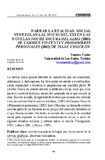Narrar la realidad social venezolana al inicio del xxi en las novelas noche oscura del alma (2005) de Carmen Vincenti y pronombres personales (2002) de Isaac Chocrón
Fecha
2017Autor
Palabras Clave
Novela venezolana del siglo XXI, Teoría social de la novela, Polifonía, Literatura venezolanaVenezuelan novel of the 21st century, Social theory of novel, Polyphony, Venezuelan literature
Roman vénézuélien du XXI siècle, Théorie sociale du roman, Polyphonie, Littérature vénézuélienne
Metadatos
Mostrar el registro completo del ítemResumen
La novela como género literario se caracteriza por ser inacabada,
polisémica y heterogénea. La diversidad en cuanto a su estructura,
estilo, argumento y temática le proporciona esa cualidad plural. El
escritor vuelca su mundo interior y artificios con un nexo que mira
hacia el contexto histórico social del momento en el que escribe la
obra. En este sentido, la hipótesis de lectura que orienta este artículo
es en las novelas Noche oscura del alma, (2005) de Carmen Vincenti
y Pronombres personales, (2002) Isaac Chocrón. La trama de amabas
novelas parte de un discurso social propio del momento histórico en
el que fueron escritas. Por tanto, se intenta dar cuenta de la realidad
social para expresar su relación eminentemente social, a partir de
algunos estudios teóricos y críticos sobre la novela (Swingeood,
1983; Lukács 2001, y Bajtín, 1989).
Colecciones
Información Adicional
| Otros Títulos | Narrating the venezuelan social reality at the beginning of the 21st century in the novels noche oscura del alma (2005) by Carmen Vincenti and pronombres personales (2002) by Isaac Chocrón - Raconter la réalité sociale vénézuélienne au début du xxi siècle dans les romans noche oscura del alma (2005) de Carmen Vincenti et pronombres personales (2002) d’Isaac Chocrón |
| Correo Electrónico | vanessanatalyc@gmail.com |
| Editor | SaberULA |
| ISSN | 1315-9435 |
| ISSN Electrónico | 2610-7902 |
| Resumen en otro Idioma | The novel as a literary genre is characterized by being unfinished,
polysemic and heterogeneous. The diversity in terms of structure,
style, argument and theme provides that plural quality. The writer
pours out his inner world and artifices with a link to the social and
historical context of the time in which his work is written. In this
sense, the reading hypothesis that supports to this article is that in
the novels Noche oscura del alma (2005) by Carmen Vincenti, and
Pronombres personales (2002) by Isaac Chocrón the plot starts
from a social discourse characteristic of the historical time in which
they were written. Therefore, based on some theoretical and critical
studies on the novel —Swingewood (1983), Lukács (2001) and
Bakhtin (1989)— this article tries to account for social reality in
order to express an eminently social relationship. - Le roman en tant que genre littéraire est caractérisé par être inachevé, polysémique et hétérogène. La diversité aux termes de structure, de style, d’argumentation et de thème lui confère cette qualité plurielle. L’écrivain verse son monde intérieur et ses artifices avec un lien qui regarde le contexte historique social du moment où l’œuvre est écrite. Dans ce sens, l’hypothèse de lecture qui supporte cet article est que dans les romans Noche oscura del alma (2005) de Carmen Vincenti, et Pronombres personales (2002) d’Isaac Chocrón, l’intrigue part d’un discours social du moment historique dans lequel ils ont été écrits. Par conséquent, à partir de quelques études théoriques et critiques sur le roman: Swingewood (1983), Lukács (2001) et Bakhtine (1989), on essaye de rendre compte de la réalité sociale pour exprimer une relation éminemment sociale. |
| Colación | 114-142 |
| Periodicidad | Anual |
| País | Venezuela |
| Institución | Universidad de Los Andes |
| Publicación Electrónica | Contexto |






